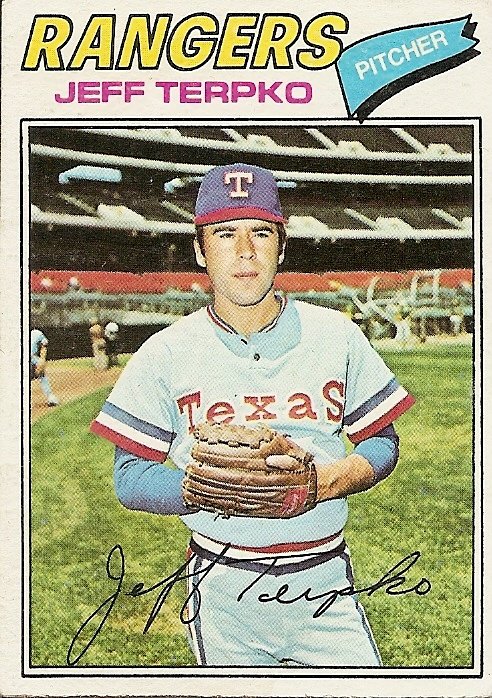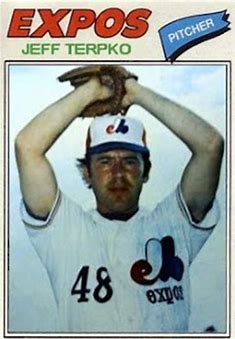
Years in MLB: 3
Teams: Texas Rangers (1974, 1976), Montreal Expos (1977)
Career: 3-4, 3.14 in 48 games
The Jeff Terpko story is one of perseverance and hard work.
Terpko came from humble beginnings in Sayre, Pennsylvania to make the big leagues in 1974. He overcame self-doubt, years in the minors, injuries, and the loss of his biggest fan – his mother – to pitch 48 games with two teams over three seasons (3-4, 3.14 ERA, all in relief).
He was also a large part of the landmark Curt Flood trade in 1970, where Greg Goosen, Gene Martin, and Terpko were traded from the Washington Senators to the Philadelphia Phillies for Flood and a player to be named later. Flood refused to report to Philadelphia, and Terpko was returned to Washington at the end of spring training in 1971.
“I spent all spring training as a Phillie,” Terpko said. “I thought that’s where I would be. Then I went back to Washington.”
Terpko was drafted in the fifth round by Washington in 1968, and by 1969 he was already pitching as a starter in AAA ball. He struggled to a 7-7/4.73 record, and says it was a humbling and learning experience.
“I used to have this big 12-6 [straight-down break] curve ball,” Terpko said. “I wrapped my wrist to throw it. It worked OK until I got to AAA. There were plenty of players in AAA who were coming back down from the big leagues, and they could ‘read’ my curve and ripped it.”
This was a different time in baseball, where players often got more help from each other than from coaches. And there was no video to rely on, or pitch tracking.
The solution was “a more slurvy breaking ball. Bigger than a cutter, but not like a slider either. And I threw it from a lower arm angle,” he explained.
But a far-more-serious problem was on the horizon as Terpko went to spring training in 1970: his mother was diagnosed with cancer.
“She was a die-hard baseball fan, and she was my biggest fan,” Terpko said. “I got the word about her, and went right back to see her. But by the time I got back, I was behind the other pitchers.”
Terpko spent the 1971 season in AA and A ball, going 3-3/3.67. In 1972, he was 4-4 in A-ball and was ready to give up the game.
“In 1973, I played softball,” he said.
Again, his mother provided motivation, and turned his career around.
“She asked me, as sort of a final wish, to ask the organization [now the Texas Rangers] for another chance,” he said. “To my surprise, they gave me a second chance – but only as a reliever.”
“I knew I would have to work at it to be good in baseball. So when I struggled, my attitude was, ‘learn from this and get better. Overcome it.’” — Jeff Terpko
That was music to Terpko’s ears; he had tired of being a starter anyway.
“I didn’t like having to wait so long to get back on the mound after a start,” he said. “I wanted to play. I wanted to be in more games.”
Grateful for the opportunity, and with refined mechanics and a better mental attitude, Terpko was 11-2 in AA and AAA, with a 1.43 ERA in 1974.
“I went after it in 1974,” he said.
“I never had much as far as material possessions go, when I was growing up,” he explained. “I knew I would have to work at it to be good in baseball. So when I struggled, my attitude was, ‘learn from this and get better. Overcome it.’”
The Rangers had always been high on Terpko, he said, and so they noticed his new approach and good results. He was called up to the big leagues after his minor-league season was finished.
The Rangers were chasing Oakland, giving the A’s a run for their money deep into September.
“At first, I thought, ‘they’re in a pennant race. I won’t pitch,’” he recalled. “But in my second game there, they warmed me up in a game against Oakland.”
He didn’t get into that game, but eventually Terpko made his major-league debut September 21, 1974, pitching the ninth inning against the Royals.
What did it feel like? What does he remember about that game?
“I was walking along the grass, and people were so into it and excited. And so was I,” he recalled. “But when I got to the mound, I got into that zone where all I saw was the catcher.”
Frank White grounded to shortstop; Buck Martinez grounded to second; but Vada Pinson got a base hit and stole second base. It didn’t rattle Terpko, however.
“I figured, he hit a chopper, and in the big leagues guys beat out plays like that.”
So he struck out Al Cowens. Inning over.
Terpko faced 30 hitters in 3 games at the end of the 1974 season, going 0-0 but with a 1.29 ERA. Most importantly, he proved to himself that he could get big-league hitters out.
“I thought to myself, ‘you can do this,’” he said. Overcoming that mental hurdle, and having self-confidence, was important to him.
But there were more challenges ahead. In 1975, Terpko’s mother died. He ended up spending the season in AAA, where he was 6-4/4.11 in 43 relief appearances.
“But she saw me make the big leagues,” Terpko said. “She knew I made it.”
In 1976 he again made the big-league club, and he was 3-3/2.39 in 32 games as a short reliever.
“I had a sinking fastball that broke down-and-in to right-handed hitters,” Terpko said. “I broke a lot of bats, because I threw such a heavy ball. More than once, catchers called time and went to the mound for a break, because I was beating up their thumbs.”
In March 1977, he was traded to the Montreal Expos for Rodney Scott, and he was 0-1/5.66 in 13 games for Montreal. After the season he was drafted by the Orioles, and he was 3-3/5.00 in 18 games for AAA Rochester, his final season in organized baseball.
and he was 0-1/5.66 in 13 games for Montreal. After the season he was drafted by the Orioles, and he was 3-3/5.00 in 18 games for AAA Rochester, his final season in organized baseball.
Terpko was realistic about being at the end of the line.
“I knew I was losing my stuff, and I was holding someone else back,” Terpko said. So he became a rural mail carrier, a job he held – and enjoyed – for 30 years.
“I got to be outdoors, which I loved, and I got a good pension from it,” he said. He now works part-time giving private baseball instruction with a partner in the spring and fall.
It’s no surprise that Terpko’s approach is no-nonsense and old-school.
“I’m straight with the players, and their parents,” he told me. “Plenty of kids have physical ability but lack discipline – to stay focused on the game, or to stay at a good playing weight.”
So is baseball as much a mental game as we have been told all these years?
“Absolutely,” he said. “It made a big difference to me, and I think the mental part of things is the big difference in most careers.”
And despite the struggles and the challenges, he looks back fondly on his baseball career: his teammates, the on- and off-field adventures. And he misses his mom, and all she meant to him.
Still, he’s realistic about it all:
“How many people get to do what I did, and make the majors?”
